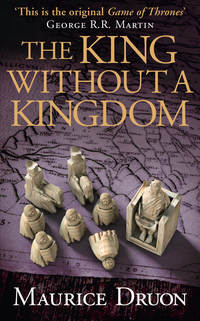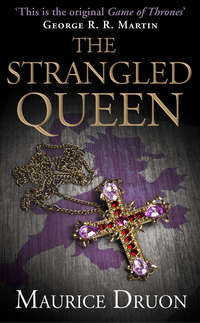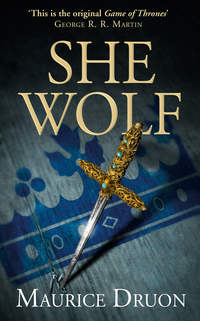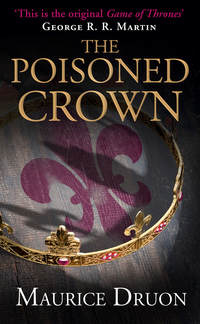
Полная версия
The Lily and the Lion
First love is the only pure and happy one. If it goes wrong, nothing can replace it. Later loves can never attain to the same limpid perfection; though they may be as solid as marble, they are streaked with veins of another colour, the dried blood of the past.
Queen Isabella turned to look at her lover Roger Mortimer, Baron of Wigmore, who owed it as much to her as to himself that he was now master of England and governed in the name of the young King. Stern-featured, his eyebrows forming a single line, he stood with his arms crossed over his sumptuous robe; he met her eyes, but his held no kindness.
‘He knows what I’m thinking,’ she thought, ‘But why does he always make one feel that it’s a crime to stop thinking of him even for an instant?’
She knew his jealous nature so well; and she smiled at him conciliatingly. What more could he want than he already had? She lived with him as if they were man and wife, even though she was Queen and he married; and she had compelled the kingdom to accept the fact of their love. She had seen to it that he had complete power; he appointed his creatures to every post; he had acquired all the fiefs of Edward II’s old favourites; and the Council of Regency obeyed his decrees and merely ratified his wishes. He had even persuaded Isabella to issue the order for her husband’s death. It was due to him that she was called the She-wolf of France! How could he expect her not to think of it on this wedding day, particularly since the executioner was present? The long, sinister face of John Maltravers, lately promoted Seneschal of England, seemed to be hanging over Mortimer’s shoulder as if to remind her of the crime.
Isabella was not the only person who resented John Maltravers’ presence. He had been the late King’s warder, and his sudden elevation to the post of Seneschal made it only too obvious for what services he was being rewarded. To those, and there were many, who were now almost certain that Edward II had been murdered, his presence was embarrassing, for they felt that the father’s murderer would have done better to keep away from the son’s wedding.
The Earl of Kent, the dead man’s brother, turned to his cousin Henry Wryneck and whispered: ‘It seems as if to kill a king entitles one to rank with his family now.’
Edmund of Kent was shivering. He thought the ceremony too long and the York rite too complicated. Why could the marriage not have been celebrated in the chapel of the Tower of London, or in some other royal castle, instead of making a public show of it? He felt uneasy under the eyes of the crowd; and the sight of Maltravers made it worse.
Wryneck, his head tilted towards his right shoulder – the infirmity which gave him his nickname – muttered: ‘The easiest way to become a member of our house is by sinning. Our friend is proof of it. Be quiet, he’s looking at us.’
By ‘our friend’ he meant Mortimer, and it showed how much the feeling had changed since he had disembarked, eighteen months before, in command of the Queen’s army and been welcomed as a liberator.
‘After all, the hand that obeys is no worse than the head that commands,’ thought Wryneck. ‘And no doubt Mortimer – and Isabella too – are guiltier than Maltravers. But we must all share some of the guilt; we all put our hands to the sword when we turned Edward II off the throne. It could end in no other way.’
In the meantime, the Archbishop was presenting the young King with three gold pieces bearing on one side the arms of England and Hainaut, and on the reverse a semy of roses, the emblematic flowers of married happiness. These gold pieces were the marriage deniers, symbols of the dowry in revenues, lands and castles, which the bridegroom was giving his bride. An accurate inventory of these gifts had been made, and this somewhat reassured Messire Jean of Hainaut, the bride’s uncle, to whom fifteen thousand livres were still owing for the pay of his knights during the campaign in Scotland.
‘Kneel at your husband’s feet to receive the deniers, Madam,’ the Archbishop said.
The people of York had been waiting for this moment, wondering whether the local rite would be observed to the end, and whether it was as valid for a queen as it was for a subject.
But no one had foreseen that Madam Philippa would not only kneel but also, in the excess of her love and gratitude, embrace her husband’s legs and kiss the knees of the boy who was making her his Queen. This chubby Flemish girl could find means of showing the impulses of her heart.
The crowd cheered enthusiastically.
‘I’m sure they’ll be very happy,’ said Wryneck to Jean of Hainaut.
‘The people will love her,’ Isabella said to Mortimer, who had moved closer to her.
The Queen Mother felt the cheers like a wound because they were not for her. ‘Philippa is the Queen now,’ she thought. ‘My day is over. Yet, perhaps, I shall now get France …’
For a courier, with the lilies on his coat, had galloped into York the week before with the news that her last brother of France, King Charles IV, lay dying.
2.
Travail for a Crown

CHARLES IV, THE FAIR, had fallen ill on Christmas Day. At Epiphany the physicians and apothecaries tending him had to admit that he was dying. What had caused the fever that consumed him, the tearing cough that shattered his emaciated chest, the blood that he spat? The physicians impotently shrugged their shoulders, It was the curse, of course: that curse which had fallen on all Philip the Fair’s heirs. And what medicines could operate against such a curse as that? Both the Court and the people were convinced there was no need to look elsewhere.
Louis the Hutin had died at the age of twenty-seven, murdered, as everyone knew, even though the Countess Mahaut of Artois had been exculpated at a public trial. Philippe the Long had died at twenty-nine through having drunk water from a well in Poitou that had been poisoned by the lepers. Charles IV had lived to the age of thirty-three; but this was the limit. It was a known fact that the accursed could never live longer than Christ.
‘It’s up to us, Brother, to seize the reins of government and to hold them with a firm hand,’ said the Count of Beaumont, Robert of Artois, to his cousin and brother-in-law, Philippe of Valois. ‘And this time,’ he added, ‘we won’t let my Aunt Mahaut beat us to it. Anyway, she has no more sons-in-law to push.’
They, at least, both enjoyed the best of health. Robert of Artois, now forty-one, was still the same colossus who had to bend his head to pass through doorways and could overturn an ox by seizing it by the horns. A master of legal procedure, of intrigue and of chicane, he had shown his ability during these last twenty years both in his lawsuit over Artois and in the war in Guyenne, among much else. It had been due to him that the scandal of the Tower of Nesle had come to light. And it was also thanks to him that Lord Mortimer and Queen Isabella had been enabled to take refuge in France, where they had first become lovers, to raise an army in Hainaut, rouse all England and turn Edward II off his throne. Nor, when he went in to dinner, did it embarrass him in the least that his hands were stained with the blood of Marguerite of Burgundy. In recent years, his voice had been more frequently heard in the Council of the weak Charles IV than the Sovereign’s.
Philippe of Valois was six years his junior and nothing like so clever. But physically he was tall, strong, wide-chested, and he moved well; he seemed to be almost a giant when Robert was not by; and he had a splendid knightly presence which was much in his favour. Moreover, he inherited the reputation of his father, the famous Charles of Valois, who had been the most turbulent and adventurous prince of his time, a pretender to phantom thrones and a supporter of unrealized crusades, yet a great warrior, whom Philippe did his best to emulate in prodigality and magnificence.
Though Philippe of Valois’ talents had not as yet made any particular mark on Europe, everyone had confidence in him. He was a brilliant performer in tournaments, which were indeed his passion; and the valour he displayed there was not negligible.
‘Philippe, I’ll make you Regent,’ Robert of Artois was saying, ‘that’s what I want, and I promise to do it. Regent, and very possibly King, if God so wills, provided my niece,2 who’s pregnant to her back teeth, doesn’t have a son in a couple of months’ time. Poor Cousin Charles! He won’t see the child he so longed for. And, even if it’s a boy, you’ll still have the Regency for twenty years. And in twenty years …’
He emphasized his thought with a wave of the arm, which seemed to include every possible hazard: infant mortality, hunting accidents, the impenetrable designs of Providence.
‘And you, as the good friend I know you to be,’ went on the giant, ‘will see to it that I get back my County of Artois, of which Mahaut, thief and poisoner that she is, has been so unjustly possessed since the death of my noble grandfather, as well as the peerage that goes with it. Just think, I’m not even a peer of France! Absurd, isn’t it? It makes me ashamed for my wife, who is after all your sister.’
Philippe nodded his head, lowering that great nose of his, and blinking his eyes in agreement.
‘Robert, justice shall be done you, if I am ever in a position to see to it. You can count on my support.’
The best friendships are based on mutual interest and common plans for the future.
Robert of Artois, who shrank from nothing, undertook to go to Vincennes and make it clear to Charles the Fair that his days were numbered and that certain arrangements must be made: the peers must be summoned at once, and Philippe of Valois recommended to them as Regent. Indeed, so as to make his selection inevitable, why should Charles not confide the administration of the kingdom to Philippe at once, delegating all powers to him?
‘We are all mortal, every one of us, my dear cousin,’ said Robert, who was himself bursting with health, as he entered the dying man’s room, shaking the bed with his heavy tread.
Charles IV was in no condition to argue; indeed, he was relieved that someone else should shoulder his responsibilities. His only concern was to cling on to life, and it was slipping between his fingers.
Thus Philippe of Valois was endued with the sovereign power and was able to summon the peers.
Robert of Artois began campaigning at once. He went first to his nephew of Evreux, a young man of twenty-one, who had great charm but lacked enterprise. He was married to the daughter of Marguerite of Burgundy, Jeanne la Petite, as she was still called, though she was now seventeen. She had been set aside from the succession to the throne of France at the death of the Hutin.
Indeed, the Salic Law had been promulgated on her account, and all the more readily adopted because her mother’s misconduct cast a serious doubt on her legitimacy. In compensation, and to appease the House of Burgundy, she had been recognized as heiress to the Kingdom of Navarre. There had, however, been no untoward haste in keeping this promise and the last two Kings of France had remained also Kings of Navarre.
Had Philippe of Evreux borne any resemblance to his uncle, Robert of Artois, he would have seized this splendid opportunity for chicanery on the largest possible scale by contesting the Law of Succession and claiming the two crowns in his wife’s name.
But Robert of Artois, who had a great ascendancy over him, would very soon have disabused him of pretensions to being a competitor.
‘You shall have Navarre which is your due, my dear nephew, as soon as my brother-in-law of Valois becomes Regent. I have insisted on it as a family matter and as a condition for giving Philippe my support. You shall be King of Navarre! It’s not a crown to be despised and, for my part, I advise you to put it on your head just as soon as you can, and before anyone else comes along to dispute it. Between ourselves, your wife would have a better claim to it if her mother had kept on the right side of the blanket. There’s going to be a scramble for power, and you had best make sure of support: you have ours. And don’t go listening to your uncle of Burgundy; he’ll simply persuade you to do something silly for his own ends. Philippe will be Regent; base your plans on that.’
In return for abandoning Navarre, Philippe of Valois could already therefore count on two votes.
Louis of Bourbon had been made a duke a few weeks before and had received the County of La Marche3 as an apanage. He was the eldest member of the family. If the question of the Regency became dangerously controversial, the fact that he was Saint Louis’ grandson might well enable him to sway several votes. In any case, his views were bound to carry weight with the Council of Peers. He was not only lame but a coward; and it would require more courage than he possessed to enter the lists against the powerful Valois clan. Moreover, his son had married a sister of Philippe of Valois.
Robert gave Louis of Bourbon to understand that the sooner he promised his support, the earlier would all the lands and titles he had accumulated as a time-server during the previous reigns be guaranteed to him. He now had three votes.
The Duke of Brittany had hardly arrived from Vannes, and his trunks were not yet unpacked, when Robert of Artois called on him.
‘You agree on Philippe, don’t you? He’s so pious and loyal, we can be sure he’ll make a good king – I mean a good regent!’
Jean of Brittany was bound to support Philippe of Valois. After all, he had married one of Philippe’s sisters, Isabella. It was true she was dead, but he could hardly do other than be loyal to her memory. To lend weight to his overtures, Robert brought along his mother, Blanche of Brittany, the Duke’s elder sister. She was very old and small and wrinkled; but though her mind was far from lucid, she invariably agreed with everything her giant of a son said. Jean of Brittany was more concerned with the affairs of his duchy than with those of France. Since everyone seemed so much in favour of Philippe, why not?
It became a campaign of brothers-in-law. Reinforcements were called up in the persons of Guy de Châtillon, Count of Blois, who was not a peer, and Count Guillaume of Hainaut, who was not even French, because they had both married sisters of Philippe. The great Valois connexion was already beginning to look like the true family of France.
Guillaume of Hainaut was at this very moment marrying off his daughter to the young King of England; there appeared to be no disadvantage in this. Indeed, it might well prove a useful match. But he had been well advised to be represented at the wedding by his brother Jean instead of going himself, for it was here, in Paris, that events of real importance were under way. Guillaume the Good had long desired the lands of Blaton, an inheritance of the Crown of France forming an enclave within his estates, to be ceded to him. If Philippe became Regent, he should have Blaton for some merely symbolic quid pro quo.
As for Guy of Blois, he was one of the last barons to have the right to mint his own coinage. Despite this right, he was disastrously short of money and crippled with debts.
‘My dear Guy, your right to mint will be bought back from you by the Regency. It shall be our first care.’
Robert had done some very sound work in a remarkably short time.
‘You see, Philippe,’ he said to his candidate, ‘how useful the marriages your father arranged are to us now. People say that a lot of girls are a misfortune to a family; but that wise man, may God keep him, knew very well how to use all your sisters.’
‘Yes, but we shall have to complete the payment of the dowries,’ Philippe replied. ‘Only a quarter of what is due has been paid on several of them.’
‘My dear wife Jeanne’s to start with,’ Robert of Artois reminded him. ‘But when we have control of the Treasury …’
The Count of Flanders, Louis of Nevers, was more difficult to win over. For he was not a brother-in-law and wanted something more than mere lands or money. His subjects had driven him out of his county and he demanded that it should be reconquered for him. The price of his support was a promise of war.
‘Louis, my cousin, Flanders shall be restored to you by force of arms, we give you our word!’
Upon which Robert, who thought of everything, hurried off to Vincennes once again in order to press Charles IV to make his will.
Charles was merely the shadow of a king now, and was coughing up what remained of his lungs.
Yet, dying though he was, his mind was obsessed by the thought of the crusade that his uncle, Charles of Valois, had put into his head. The crusade had been abandoned; and then Charles of Valois had died. Could it be that his disease and the pain he was suffering were a punishment for having failed to keep his oath? His red blood staining the sheets reminded him that he had not taken up the cross to deliver the land in which our Lord had suffered his Holy Passion.
In an attempt to win God’s mercy, Charles IV therefore insisted on recording his concern for the Holy Land in his will: ‘For my intention,’ he dictated, ‘is to go there during my lifetime and, if that proves impossible, fifty thousand livres shall be allotted to the first general expedition to set out.’
This was not at all what was required of him, nor indeed that he should encumber the royal finances, which were urgently needed for more pressing matters, with such a mortgage. Robert was furious. That fool Charles was being stubborn to the last!
Robert merely wanted him to leave three thousand livres each to Chancellor Jean de Cherchemont, Marshal de Trye and Messire de Noyers, the President of the Exchequer, on account of their loyal services to the Crown – and, incidentally, because they sat on the Council of Peers by right of their appointments.
‘What about the Constables?’ murmured the dying King.
Robert shrugged his shoulders. Constable Gaucher de Châtillon was seventy-eight years old, deaf as a post, and so rich he did not know what to do with his money. You did not develop a sudden love of gold at his age. The Constable’s name was crossed out.
On the other hand, Robert proved most helpful to Charles in the matter of appointing executors, for this would establish a sort of order of precedence among the great men of the realm. Count Philippe of Valois headed the list, then came Count Philippe of Evreux, and then Robert of Artois, Count of Beaumont-le-Roger, himself.
Having dealt with the will, Robert now turned his attention to the spiritual peers.
Guillaume de Trye, Duke-Archbishop of Reims, had been Philippe of Valois’ tutor; and Robert had had his brother, the Marshal, put into the royal will for three thousand livres, which he made ring to good effect. There would be no difficulties in that direction.
The Duke-Archbishop of Langres had long been a supporter of the Valois, as had also Jean de Marigny, Count-Bishop of Beauvais, who had even betrayed his brother, the great Enguerrand, to serve the hatreds of the late Monseigneur Charles of Valois.
There remained the Bishops of Châlons, Laon and Noyon; and these, it was known, would follow Duke Eudes of Burgundy.
‘As for the Burgundian,’ cried Robert of Artois, with a wide sweep of his arms, ‘he’s your affair, Philippe. I can do nothing with him; we’re at daggers drawn. After all, you married his sister and you must be able to bring some pressure to bear on him.’
Eudes IV was no diplomatic genius. But he remembered the lessons he had learned from his mother, Agnes of France, the last surviving daughter of Saint Louis, who had died the preceding year, and how the determined old woman had succeeded in negotiating, during Philippe the Long’s regency, the reuniting of the County of Burgundy and the duchy. Eudes had then married Mahaut of Artois’ granddaughter, who was twenty-seven years younger than himself, but he no longer complained of this now that she was nubile.
The question of the Artois inheritance was the first subject he discussed with Philippe of Valois, when they were closeted together on his arrival from Dijon.
‘It is quite understood, of course, that at Mahaut’s death, the County of Artois goes to her daughter, Queen Jeanne the Widow, with remainder to the Duchess, my wife, is it not? I must make a point of this, Cousin, for I well know Robert’s pretensions to Artois; he has proclaimed them enough!’
These great princes were as bitter in defence of their right of inheritance to a quarter of the kingdom as were the daughters-in-law of the poor in squabbling over cups and sheets.
‘Judgement has twice been given assigning Artois to the Countess Mahaut,’ replied Philippe of Valois. ‘Unless any new facts come to light supporting Robert’s claim, Artois will go to your wife, Brother.’
‘You see no impediment?’
‘None at all.’
And thus the loyal Valois, the gallant knight, the hero of tournaments, had now given two contradictory promises.
Nevertheless, honest in his duplicity, he told Robert of Artois of his conversation with Eudes, and Robert wholly approved it.
‘The main thing,’ he said, ‘is to acquire Burgundy’s vote. What does it matter that he should feel secure in a right which is not his anyway? New facts, you said? Very well, we’ll produce some, and I won’t make you break your word. Don’t worry, it’s all for the best.’
They had now merely to wait for one last formality – the King’s death. It was to be hoped it would not be long delayed, for this splendid conjunction of princes in support of Philippe of Valois might not endure.
The Iron King’s last son died on the eve of Candlemas, and the news of his death spread through Paris the next morning, together with the odour of the hot flour of pancakes.
Robert of Artois’ plans seemed to be working perfectly when, on the very morning the Council of Peers was to be held, a thin-faced, tired-eyed English bishop arrived in a mud-stained litter to urge the claims of Queen Isabella.
3.
A Corpse in Council

THERE WERE NO BRAINS in the head now, no heart in the breast, nor entrails in the stomach. He was a hollow king. But, indeed, there was little difference between Charles IV alive and now that the embalmers had done their work. He had been a backward child, whom his mother had called ‘the Goose’, a cuckolded husband, and an unsuccessful father, for he had vainly, if stubbornly, endeavoured to assure the succession by marrying three times; he had also been a weak prince, first subject to an uncle and then to cousins, indeed but a fleeting incarnation of the royal entity.
On the state bed, at the far end of the great pillared hall of the Castle of Vincennes, lay his corpse, clothed in an azure tunic, a royal mantle about its shoulders and the crown on its head.
By the light of the massed candles, the peers and barons gathered at the other end of the hall could see the gleam of the corpse’s boots of cloth of gold.
Charles IV was presiding over his last Council, which was known as ‘the Council in the King’s Chamber’, for he was deemed to be ruling still. His reign would end officially only on the following day, when his body was lowered into the tomb at Saint-Denis.
Robert of Artois had taken the English bishop under his wing, while they waited for the latecomers.
‘How long did it take you to get here? Twelve days from York? You can’t have wasted much time saying masses on the way, Messire Bishop. You’ve made as much speed as a courier! Did your young King’s wedding go off well?’
‘I expect so. I was unable to take part in it, for I was already on my way,’ replied Bishop Orleton.
And was my Lord Mortimer in good health? Lord Mortimer was a good friend, and had often mentioned Monseigneur Orleton who had organized his escape from the Tower of London. It had been a great exploit on which Robert complimented the Bishop.









